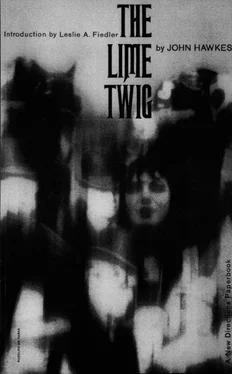The door was off the latch and they were sleeping. I turned and touched it with my hip, my elbow, touched it with only a murmur. And it swung away on smooth hinges while I watched and listened until it came up sharply against the corner of a little cane chair. They lay beneath a single sheet and a single sand-colored blanket, and I saw that on his thin icy cheeks Banks had grown a beard in the night and that Margaret — the eyelids defined the eyes, her lips were dry and brown and puffy — had been dreaming of a nice picnic in narrow St. George’s Park behind the station. Behind each silent face was the dream that would collect slack shadows and tissues and muscles into some first mood for the day. Could I not blow smiles onto their nameless lips, could I not force apart those lips with kissing? One of the gulls came round from the kitchen and started beating the glass.
“Here’s breakfast,” I said, and pushed my knees against the footboard.
For a moment the vague restless dreams merely went faster beneath those two faces. Then stopped suddenly, quite fixed in pain. Then both at once they opened their eyes and Banks’ were opalescent, quick, the eyes of a boy, and Margaret’s eyes were brown.
“It’s five and twenty past six,” I said. “Take the tray now, one of you. Tea’s getting cold. …”
Banks sat up and smiled. He was wearing an undervest, his arms were naked and he stretched them toward me. “You’re not a bad sort, Hencher,” he said. “Give us the tray!”
“Oh, Mr. Hencher,” I heard the warm voice, the slow sounds in her mouth, “you shouldn’t have gone to the trouble. …”
It was a small trouble. And not long after — a month or a fortnight perhaps — I urged them to take a picnic, not to the sooty park behind the station but farther away, farther away to Landingfield Battery, where they could sit under a dead tree and hold their poor hands. And while they were gone I prowled through the flat, softened my heart of introspection: I found her small tube of cosmetic for the lips and, in the lavatory, drew a red circle with it round each of my eyes. I had their bed to myself while they were gone. They came home laughing and brought a postal card of an old pocked cannon for me.
It was the devil getting the lipstick off.
But red circles, giving your landlord’s bed a try, keeping his flat to yourself for a day — a man must take possession of a place if it is to be a home for the waiting out of dreams. So we lead our lives, keep our privacy in Dreary Station, spend our days grubbing at the rubber roots, pausing at each other’s doors. I still fix them breakfast now and again and the cherubim are still my monument. I have my billet, my memories. How permanent some transients are at last. In a stall in Dreary Station there is a fellow with vocal cords damaged during the fire who sells me chocolates, and I like to talk to him; sometimes I come across a gagger lying out cold in the snow, and for him I have a word; I like to talk to all the unanswering children of Dreary Station. But home is best.
I hear Michael in the bath, I whet Margaret’s knives. Or it is 3 or 4 A.M. and I turn the key, turn the knob, avoid the empty goldfish bowl that catches the glitter off the street, feel the skin of my shoes going down the hallway to their door. I stand whispering our history before that door and slowly, so slowly, I step behind the screen in my own dark room and then, on the edge of the bed and sighing, start peeling the elastic sleeves off my thighs. I hold my head awhile and then I rub my thighs until the sleep goes out of them and the blood returns. In my own dark room I hear a little bird trying to sing on the ledge where the kidneys used to freeze.
Smooth the pillow, pull down the sheets for me. Thinking of Reggie and the rest of them, can I help but smile?
I can get along without you, Mother.
SIDNEY SLYTER SAYS
Happy Throngs Arrive at Aldington for Golden Bowl …
Mystery Horse to Run in Classic Race …
Rock Castle: Dark Horse or Foul Play?
Gray toppers, gray gloves and polished walking sticks; elegant ladies and smart young girls; fellows in fedoras, and mothers, and wives — all your Cheapside crowd along with your own Sidney Slyter, naturally. Pure life is the only phrase that will do, life’s pure anticipation. … So you won’t want to show up here without a flower in your buttonhole, I can tell you that. … The horses are lovely. Sidney Slyter’s choice? Marlowe’s Pippet without a doubt — to win (I took a few pints last night with a young woman, a delightful Mrs. Sybilline Laval, who said that Candy Stripe looked very good. But you’ll agree with Slyter. He knows his horses, eh?) … A puzzling late entry is Rock Castle, owned by one Mr. Michael Banks. But more of this …
It is Wednesday dawn. Margaret’s day, once every fortnight, for shopping and looking in the windows. She is off already with mints in her pocket and a great empty crocheted bag on her arm, jacket pulled down nicely on her hips and a fresh tape on her injured finger. She smells of rose water and the dust that is always gathering in the four rooms. In one of the shops she will hold a plain dress against the length of her body, then return it to the racks; at a stand near the bridge she will buy him — Michael Banks — a tin of fifty, and for Hencher she will buy three cigars. She will ride the double-decker, look at dolls behind a glass, have a sandwich. And come home at last with a packet of cold fish in the bag.
Most Wednesdays — let her stay, let her walk out— Michael does not care, does not hold his breath, never listens for the soft voice that calls good-by. But this is no usual Wednesday dawn and he slips from room to room until she is finally gone. In front of the glass fixes his coat and hat, and smiles. For he intends not to be home when she returns.
Now he is standing next to their bed — the bed of ordinary down and ticking and body scent, with the course of dreams mapped on the coverlet — and not beside the door and not in the hall. Ready for street, departure, for some prearranged activity, he nonetheless is immobile this moment and stares at the bed. His gold tooth is warm in the sun, his rotting tooth begins to pain. From out the window the darting of a black tiny bird makes him wish for its sound. He would like to hear it or would like to hear sounds of a wireless through the open door or sounds of tugs and double-deckers and boys crying the news. Perhaps the smashing of a piece of furniture. Anything. Because he too has his day to discover and it is more than pretty dresses and gandering at a shiny steam iron and taking a quick cup of tea.
He can tell the world.
But in the silence of the flat’s close and ordinary little bedroom he hears again all the soft timid sounds she made before setting off to market: the fall of the slippery soap bar into the empty tub, the limpid sound of her running bath, the slough of three fingers in the cream pot, the cry of bristles against her teeth, the fuzzy sound of straps drawing up on the skin of her shoulders; poor sounds of her counting out the change, click of the pocket-book. Then sounds of a safety pin closing beneath the lifted skirt and of the comb setting up last-minute static in the single wave of her hair.
He pulls at the clothes-closet door. He steps inside and embraces two hanging and scratchy dresses and her winter coat pinned over with bits of tissue. Something on a hook knocks his hat awry. Behind him, in the room, the sunlight has burned past the chimes in St. George’s belfry and is now more than a searching shaft in that room: it comes diffused and hot through the window glass, it lights the dry putty-colored walls and ceiling, draws a steam from the damp lath behind the plaster, warms the small unpainted tin clock which she always leaves secreted and ticking under the pillow on her side of the bed. A good early-morning sun, good for the cat or for the humming housewife. But the cat is in the other room and his wife is out.
Читать дальше












